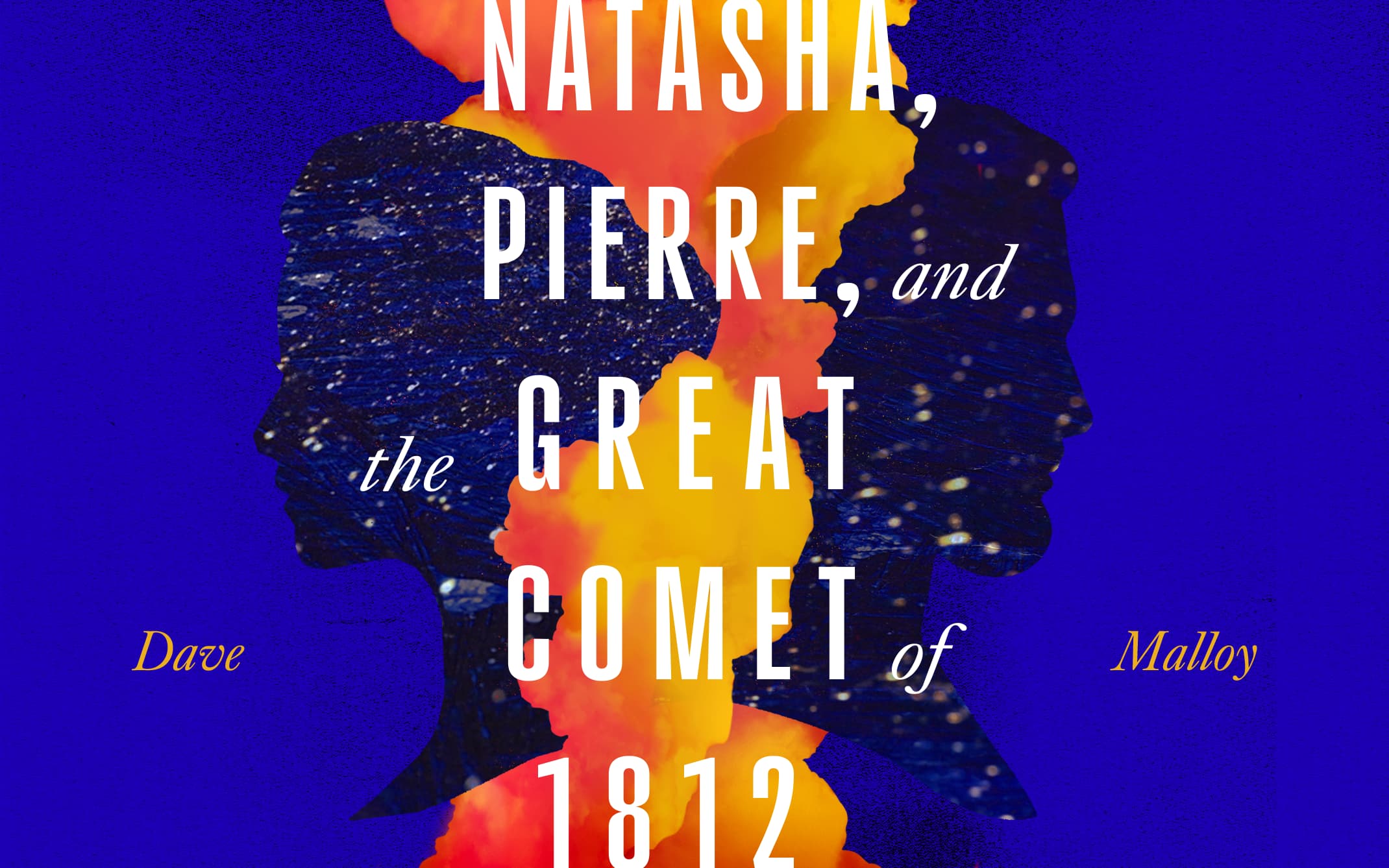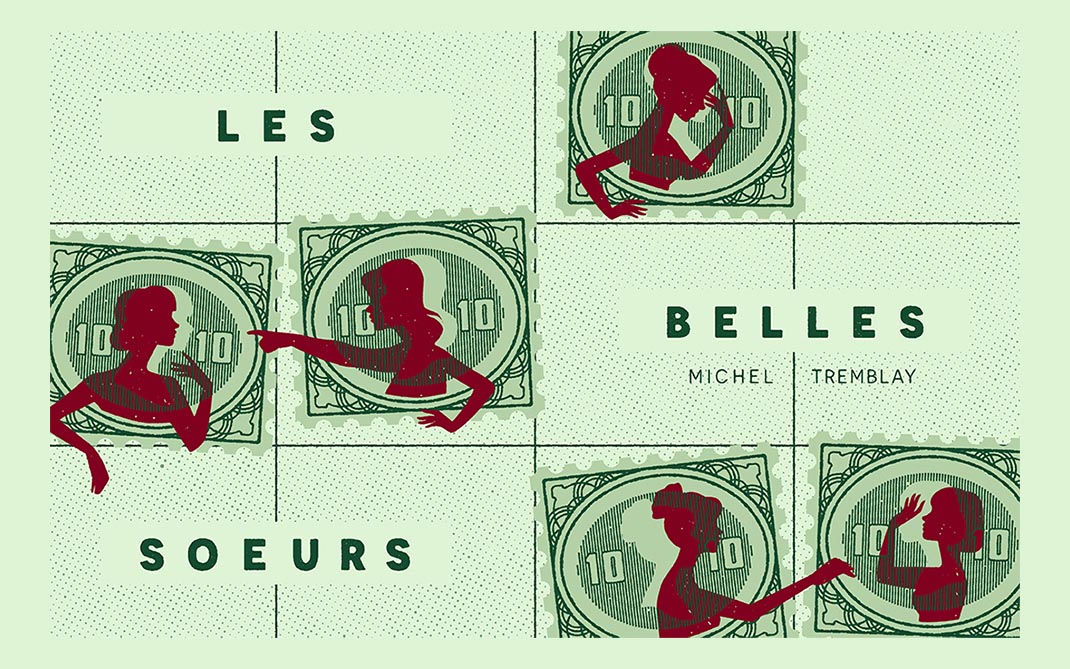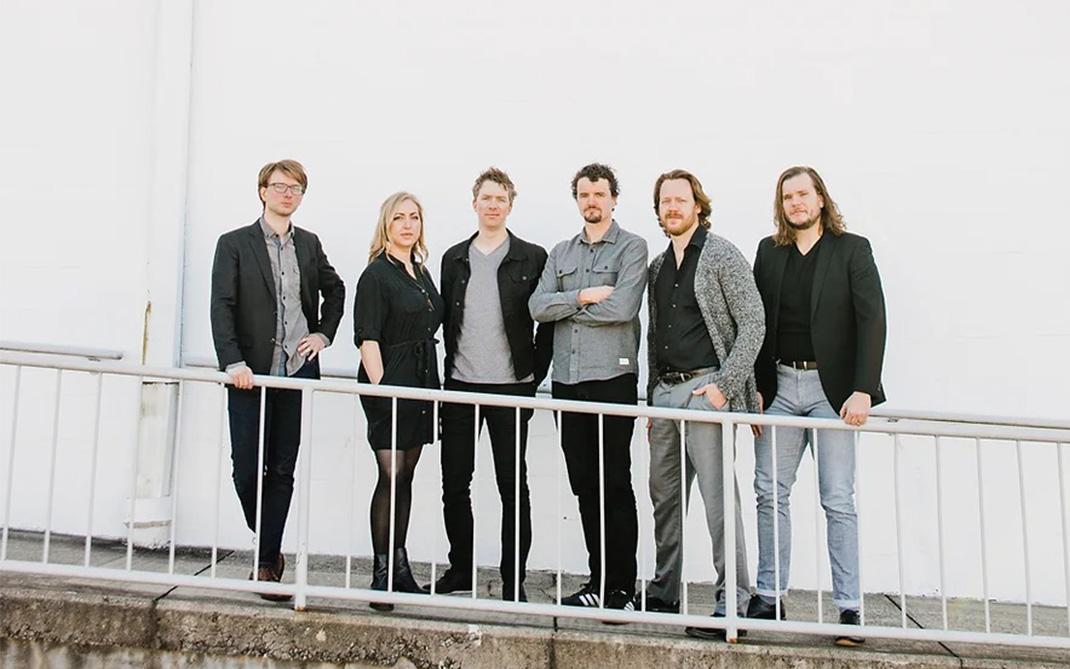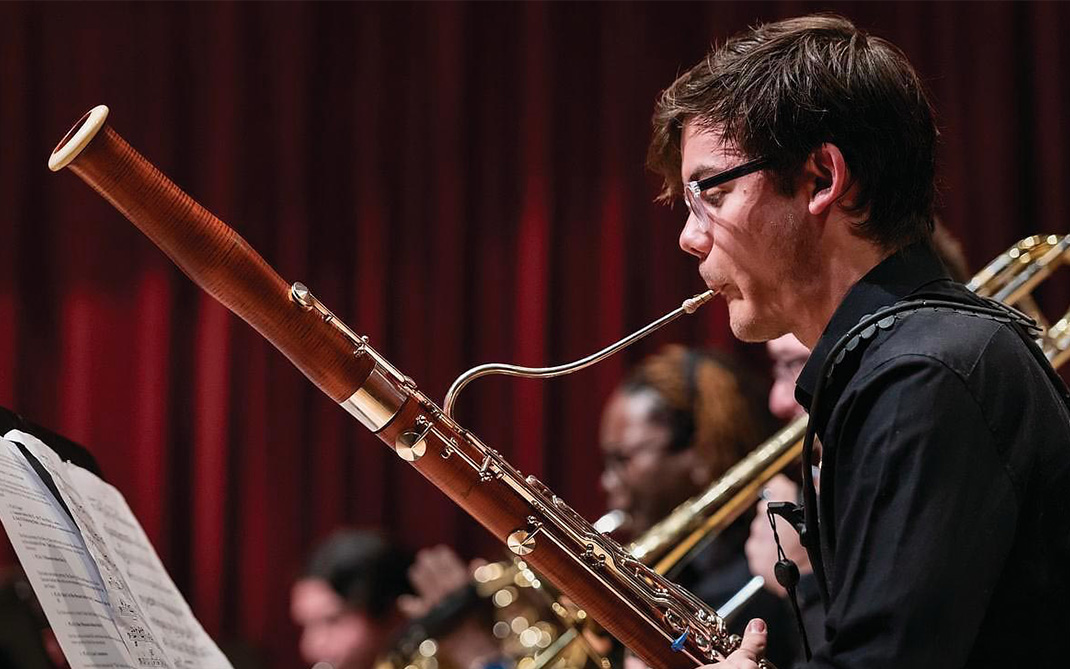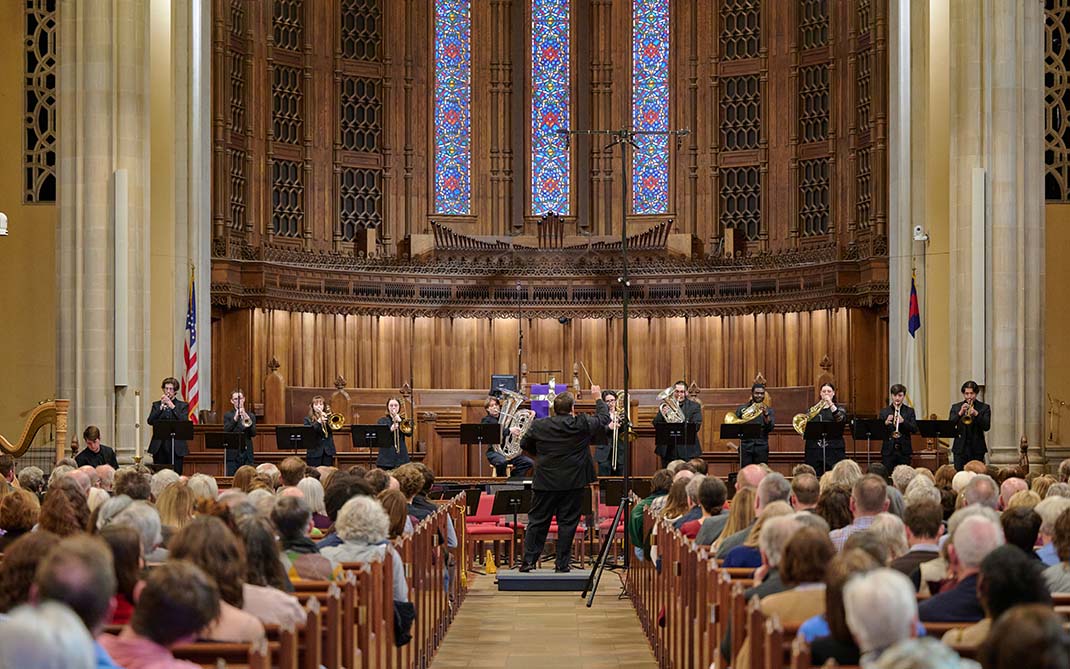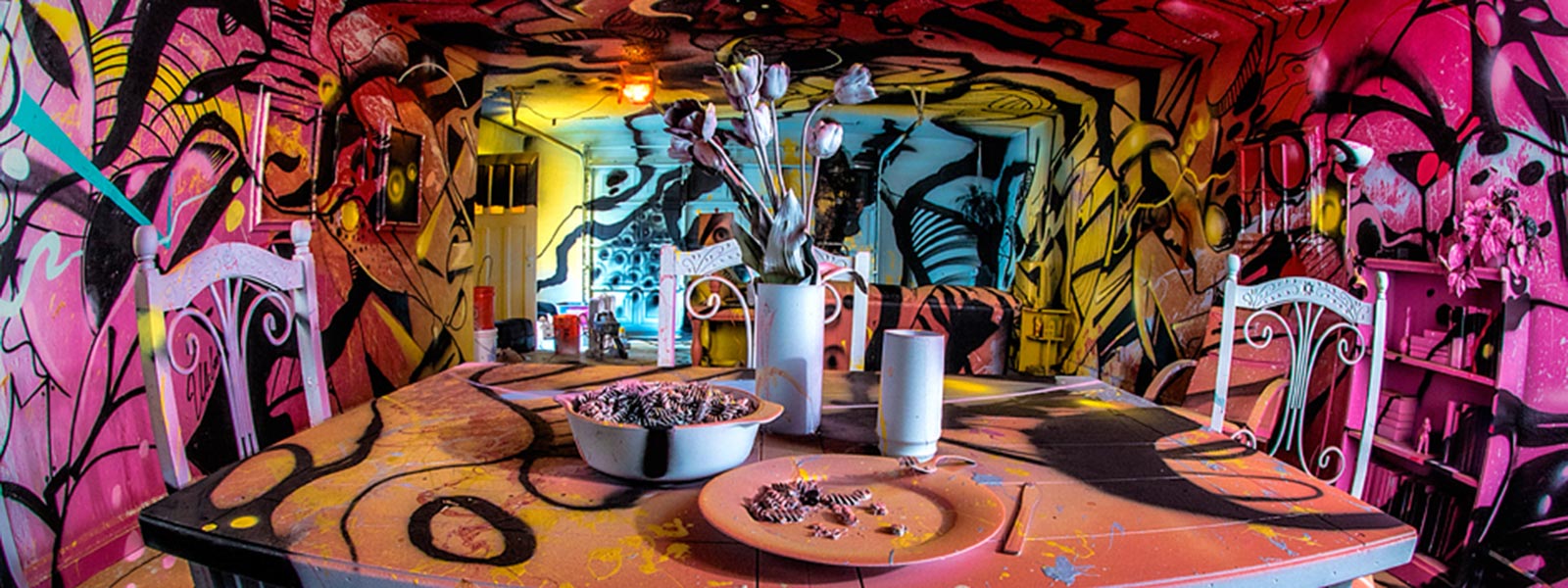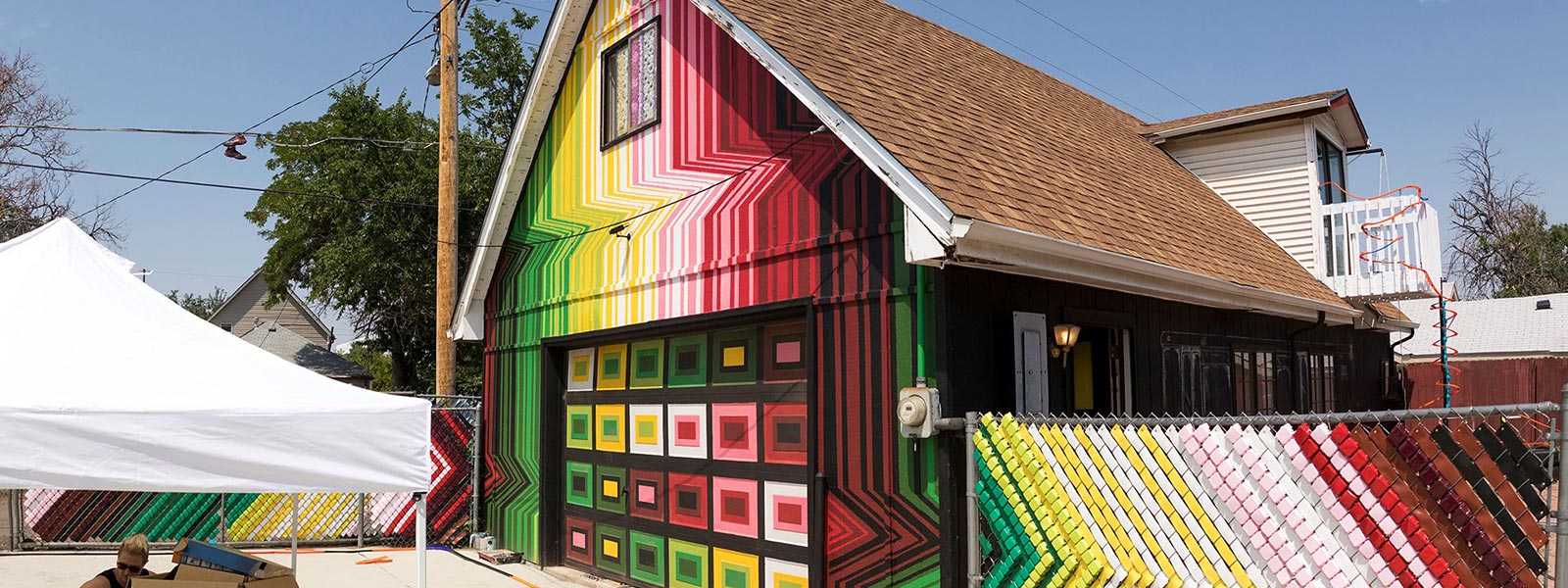Evan Weissman
The views and opinions expressed by speakers and presenters in connection with Art Restart are their own, and not an endorsement by the Thomas S. Kenan Institute for the Arts and the UNC School of the Arts. This interview has been edited for length and clarity.
In 2012, theater-maker Evan Weissman founded Warm Cookies of the Revolution, a civic health club in Denver, CO. What exactly is a civic health club? Warm Cookies’ own description can’t be beat: “Well, you go to a gym to exercise your physical health, a religious institution to exercise your spiritual health, and a therapist to exercise your mental health. Warm Cookies of the Revolution is where you go to exercise your Civic Health.”
Since Warm Cookies’ founding, Evan and his team have developed evermore inventive and entertaining ways to introduce citizens — particularly those who are not traditionally decision-makers, such as young people, recent immigrants and those with fewer resources — to the many ways in which they can participate in and contribute to the civic planning that shapes their communities. Through over 200 unique programs and a jam-packed schedule of ongoing activities, Warm Cookies of the Revolution has convinced thousands of Denver residents to raise their voice on civic issues from neighborhood development to the use of tax dollars and the needs of aging populations. All along the way, they have also lived up to their name by treating their community to mountains of cookies and oceans of milk.
Evan’s work has earned him national and statewide recognition. Evan was selected as a 2019 Roddenberry Fellow for innovative activism as well as a 2019 Livingston Fellow from Bonfils-Stanton Foundation. He was awarded the 2019 Colorado Governor’s Award for Creative Leadership and the 2018 Parr Widener Civic Leadership Award from the Denver Foundation. Evan was Denver Commissioner for Cultural Affairs in 2017 and Creative in Residence at the Denver Art Museum in 2015.
In this interview with Pier Carlo Talenti, Evan reveals how the ethos that first guided him as a theater artist led him to become a community leader who has figured out how to make civic engagement as fun as it is essential.
Choose a question below to begin exploring the interview:
- How has your civic health center cared for your community through the recent upheaval?
- What in your theater background made your creation of Warm Cookies of the Revolution possible? Which of your theater skills do you regularly use?
- Can you name some wins you think you’ve had in the nine years that Warm Cookies has been around?
- How have you managed to keep your organization so nimble? How have you kept it from becoming calcified?
- As you survey the coming 12 months, what projects are you most looking forward to?
Pier Carlo Talenti: I think one of the best ways to dive right into the work and challenges of Warm Cookies of the Revolution is to ask you how you and the organization rose to meet the challenge of the last couple of years. How has your civic health center cared for your community through the recent upheaval?
Evan Weissman: There were a couple of things that went on. One is we are like an amoeba. We don’t have very defined borders in terms of who’s involved and when and how much. We’re really flexible in terms of what we do and how we do it. Creative barriers, challenges and obstacles are helpful, as I’m sure you and many people who create things know.
Personally, individually for different folks and within our community, there was just a lot of pain. It was hard; we don’t have to go over that. But in terms of responding to what’s going on, we were able to take it in stride in some ways. Not to say that it’s been easy or that it’s the way we would have wanted it to go, but that’s the first thing: We’re not a bureaucratic institution, where shifting things takes a lot of time and effort. It’s very easy for us to do.
But in terms of the actual work, in a very practical way we started making things that were more socially distant. A lot of it was video. I don’t think we’ve done anything on Zoom. I think we participated in something at the Museum of Contemporary Art that was Zoom-based — we curated a conversation — but otherwise we’ve made videos, things for people to watch on their own time, and then incorporated lots of different people in the making of those.
We shifted in that the challenge was still to connect with people, to make creative things and use creativity to engage people; it was just a different way of doing it.
Then we’ve also created some things that you can hold, some actual books of sorts, which we can get into and talk about. We shifted in that the challenge was still to connect with people, to make creative things and use creativity to engage people; it was just a different way of doing it. In some ways, it taught us a lot and it was more successful, and in other ways it’s less successful.
Pier Carlo: What ways are those?
Evan: I’ll give examples. Right when the pandemic started, there were two things that we did that shifted right away. One was, pretty much everyone I know lost most of their work, whether these are performing artists or people who work in service industries. We wanted to get people paid to do what it is that they do, because there was a lot of talk of, “Oh, we should get artists to help with something COVID-related,” which is fine but it’s not quite the same.
We wanted to get folks paid to make art. Then we wanted to respond to and document what was going on, so we made this digital gift basket. What we learned from that was you actually can get a lot of people to see things. It can travel pretty far. At Warm Cookies it’s all about local and live and in-person and you’ve got to show up, and a lot of times that means we need to go to where people are. We pushed aside, not in any smart way, but we haven’t done a lot of video or online things. So it was helpful to know, “We can still reach people.”
We had some really incredible artists making beautiful things, and we packaged it up so that it was truly like, “Here, pass this gift basket on to anyone you think you might want to see it.”
Pier Carlo: So somebody could have gifted me a digital gift basket? Give me examples of what I would find.
Evan: Yeah, it was about an hour long, so you could watch it when you wanted. You would see some performance art. You would see funny, silly, little tiny seven-second clips. You would see examples of people making the art they do. Printmaking. You would see people talking about particular types of dance that they do from their culture. You would see a recipe for baking. All these different things that were what people were doing.
Some of it very specifically addressed what was going on exactly at the time. There’s a beautiful little poem in the beginning from Bobby LeFebre looking at what six feet [of social distancing] meant. He’s in a mask; he builds a six-foot cage around himself. Some were absolutely just silly, dumb. My folks from my former life at Buntport Theater, they made basically a narration that you’re listening to and then you’re watching someone in a sped-up version make a really bad Photoshop collage. That was just something fun and silly.
Pier Carlo: You were able to pay all the artists for their participation?
That was a lesson as well: that people want to help and people knew the importance of having art and having some levity in the midst of what was a weird, weird time.
Evan: Yes. We reached out super-quick to some local foundations and a national foundation too and let them know what was going on. They all responded so quickly. That was great. We paid people well for this. That was a lesson as well: that people want to help and people knew the importance of having art and having some levity in the midst of what was a weird, weird time. That was the first thing. We could talk more about the gift basket, because I think there was some interesting things there.
But the second thing that I think applies is we were planning on doing what was going to be a Census Carnival. This was based on something that we’ve done for years, which is a Tax Day Carnival. This is taking the National Day of Mourning, which is Tax Day, and saying: “All right, well this should be a celebration, regardless of your opinion on it. If you hate taxes, fine, come in and celebrate it. ‘Hey great, we don’t want to fund anything!’ [Same for] a proud-to-pay, moderate Democrat who’s like, ‘I enjoy this; I like paying for these things!’” Anyway, we’ve done that for a long time; it’s a carnival with jugglers and ice sculptors and carny freaks and games. We work with all the tax people to create carnival games that people come and play and learn something.
We were going to do that with the census. We were approached by some folks to help them engage with some very specific communities, in some of the immigrant and mostly in the refugee populations. Our idea was to do this carnival, where we had artists from all these different communities performing.
What we had to do to shift was we made it online. We made videos of it. But what was beautiful was we had all these different artists perform in whatever their medium was and then speak in their language to their folks to dispel, right at the end, to just say, “Here are the myths of filling out the census, and here’s why it’s important.” These were short little performances, and then we grouped them all together so anyone could see.
I think that taught us as well. Again, that was the same lesson of, “Yeah, this is just another way of doing it. You have to figure it out.” I think the challenges were, a lot of people are used to seeing us more often and seeing each other more often. I don’t think there is a substitution for being live with other humans when you’re working for something. There’s something about the spontaneity. You can do a lot online, it is a beautiful thing, but it’s not the same.
Pier Carlo: What in your theater background made your creation of Warm Cookies of the Revolution possible? Which of your theater skills do you regularly use?
Evan: That’s a good question. I learned everything from my partners over there at Buntport. They are some of the most creative people that I know. Definitely a lens of making a lot with a little, making huge worlds come alive in tiny spaces with miniatures or puppets or whatever we’re given. I think that idea of obstructions being springboards, we did that very purposefully at Buntport. When making shows, we would often just start with that. Sometimes it was because someone donated a van to us or some fake synthetic ice and so we made a show that took place all in a van. Or we made a show called “Kafka on Ice” because we thought, “Who would hate to be in an ice capade? Probably Franz Kafka!”
Or we also put these limitations on ourselves to create things. That might be, “All right, this next show we’re going to make, it has to be travel-able. It has to be able to fit in the back of a car so that we could take this places.”
I think also the style of theater that we do … you haven’t met more un-theater-y people [he laughs]. Almost never is there a fourth wall. But we do not touch the audience. There’s more avant-garde, experimental theater, I think you might call it, which is really cool stuff, but it’s not … . We’re not going to hold up a mirror and throw mustard on you or that kind of thing. We just acknowledge — that’s always been the vibe — “You’re sitting there, and I’m up here performing. Let’s begin. I’m going to tell you a story.”
I think that would probably be the second thing, acknowledging the situation we’re in. For the first thing about the resources, I made the link because the other part of my background is I come from lefty-activism world.
Pier Carlo: So the two operated in tandem, the theater and the activism?
Evan: Yeah. The theater became my job. We started it, and then quickly it took off and it became our full-time jobs, whereas I’ve never gotten paid for activism. But yes, both of those things were things that I did. And separate. I never was like, “I want to make puppets for street theater or for activism.” Often — not always, but often — the shows we made, though, had a moral grounding or something we wanted to say. They often were just interesting or funny. So those two things were actually quite separate in my life.
I think part of wanting to start Warm Cookies was bridging that a little bit. But I also saw the connections, because if you’re pushing for something, there are always going to be limitations and you have to respond to them. A budget gets cut in the city, a law changes, there’s an infiltrator in your movement, there are setbacks after setback after setback, and how you respond to it is going to be the test of if you’re serious or not.
I think those connections I saw real clearly with folks in my community, just feeling like if we’re dealing with an infrastructure challenge or housing needs or whatever the issue might be — the legacy of racism or unjust immigration laws — those barriers are going to come over and over and over and over again. How are we getting past them or around them or through them or smash them or dig a hole under them? That was happening.
I think I wanted to somehow merge the two for, I think, two reasons. I wanted to win. I’ve been to a lot of protests where it’s just a couple of us. We believe we’re in the right, but it doesn’t seem to matter. I do believe pretty firmly that the most important question to ask is, “Is this right? Am I doing the right thing?” If that means you’re the only person out there, well then that’s fine. But then the second question should be, “How can I be most effective?” I think when you flip those, that leads to people collapsing a lot more or being satisfied with what’s possible as opposed to what it is that we really want. I would say that we hadn’t focused enough on the effectiveness, and so I wanted to win.
I like sports, and I always have. You’re not supposed to say that in lefty circles and not even that much in artistic circles; those things are kind of different. But it’s just true. At sports bars the most passionate and fact-based conversations I would ever see would be a couple of dudes talking about what some coach just did.
Pier Carlo: With a deep historical knowledge also, right?
Evan: Exactly. And time. People who play fantasy football, it is a lot of time and energy and effort. I think that what I ultimately understood and wanted to do was: This is what people do. The competition for your time is Netflix, shopping, sports, music, church, these big things that people who have very limited money and limited time, after they take care of the necessary stuff, that’s what they spend their time and money on. Instead of pushing that away and trying to be morally right … . Walking into a sports bar with a Save the Whales sign, that’s not going to work, no matter how right it might be to save the whales or whatever the issue is. But if you can go and talk with folks at the sports bar about the game and then also be like, “Who paid for the stadium over there? Who makes the money off that stadium? Why is it parking gets messed up?”
Pier Carlo: Actually, since you brought it up, let’s talk about wins. Can you name some wins you think you’ve had in the nine years that Warm Cookies has been around?
Evan: Yeah, I think I would put wins in a couple departments. There are specific, tangible wins, and then there are cultural shifts. Sometimes one is more than the other, but let’s talk specific, tangible wins.
For about four years we worked — this was a really fun, interesting project — with different residents. The project was called “This Machine Has a Soul.” The ultimate goal was to push the city of Denver to adopt participatory budgeting, the most boring-sounding name you can ever imagine.
Pier Carlo: [Laughing] I just fell asleep right there.
Ultimately participatory budgeting is neighborhoods deciding parts of the city budget, not putting your input in, not writing something on a sticky note and seeing what happens, but actually deciding. It’s a pretty revolutionary thing.
Evan: Yeah, exactly. Exactly! Like, “I’m sorry, what? OK, I’m going to head over this way.” Ultimately participatory budgeting is neighborhoods deciding parts of the city budget, not putting your input in, not writing something on a sticky note and seeing what happens, but actually deciding. It’s a pretty revolutionary thing.
We used art in service of this. We made some really cool, interesting, weird stuff. Your first introduction to it: You just live where you live; you might have a neighbor come up and say, “Hey, come to this meeting. It’s on this thing, for this issue.” Maybe in the flyer that you saw it looked interesting.
Then you show up, and the first thing that you do is … . We built these machines, these two different machines. One of them is essentially a Rube Goldberg machine, you know, where the chicken lays the egg and the egg hits this and the dominoes and blah blah blah. We would have a magician or a poet or someone facilitating. They essentially would say, “All right, here’s this coin. Everyone in the room right now, if I gave you $1 million, what would you spend it on?” They’d talk, and then they’d say, “OK, it’s for housing for the homeless.” Whatever it was.
Then they’d say, “OK, thank you. Put your coin in the machine.” Then you see this machine ding dong doop doop doop doop doop, all this stuff, and out of a printer prints something. Usually the way we do it is, on the City of Denver letterhead it would say, “Thank you for your comments and concerns.” Then you think, “Um, OK.” Because that’s how most community engagement efforts happen. Most places, that rings true.
Then we had a second machine that expressed what participatory budgeting would be like, or it exemplified it. You had to get in and figure it out. You got to choose. There were exciting paths. You needed some outside help. There were times when one person couldn’t do it. It’s like those puzzle rooms; it was based on that. So there’s a key. You need two keys, and one person can’t reach so you need someone else to help. It was fun, it was hard, it was engaging, and you were in control of the process. That was someone’s introduction. Then you’re like, “OK, now we’re going to train you on what this whole process is.” You always had these two metaphors to go back to.
There was a lot to this, so then I’ll just say the other major part of it was we built an installation in a two-story garage in one of the neighborhoods where we were. [The installation] was very funky. It looked like a person lived there. We had Hot Wheels tracks that ran throughout. The major issues in this neighborhood are that the major I-70 highway was being expanded and it runs through the middle of this neighborhood. We had this highway running throughout, and then we had all sorts of artists and interesting things to engage people.
To the win is, it worked. We pushed and pushed a city council and an administration that was firmly against it, and then finally this year it is being implemented. We have residents and organizers who are helping to run the community engagement for it. It was $1.7 million, which is nice but not giant. This is the first one. Then it was approved for next year’s budget as well, and so that’s a big win.
Pier Carlo: The first what?
Evan: Oh, I’m sorry. The first participatory budgeting process, the city of Denver saying, “We’re taking public money.” Because what we did, we had people do it and we had some private money from a grant award that we let people spend it on, but it was much smaller. Now this is the city saying, “Here is a percentage of our budget that we’re going to allocate to this, and residents are going to decide where this money is needed.”
Ours was the first arts-based participatory budgeting project anywhere, and it’s something that’s taking off in other places.
Ours was the first arts-based participatory budgeting project anywhere, and it’s something that’s taking off in other places. In Paris, France, 5% of their entire budget is done with participatory budgeting, which is a lot of money. So that’s a win. I know that was longwinded, but that was a true win.
I should also say the other win about it was who took part. Because in all of these community-engagement efforts, the whole point of what we do is to try to not get the usual suspects there. Our two processes that we ran overrepresented every historically marginalized group, racially, ethnically, and income level. We had poorer folks; we had younger folks; we had folks from the Black community, the Latinx community, Asian American community, overrepresented. That was really intentional and important. That was art in the service of a policy change, and we won. That’s great. That’s a beautiful feeling.
A lot of the things that we do, I’ll be honest, are like the census thing I mentioned to you. We helped raise the rates of the census, of people who filled out the census, the response rate. That was the goal, and that’s good, and that’s neat. But I think that for a lot of the things that we deal with creatively, I don’t know how well you measure them, because we deal with things like what does it mean to be friends with friendless people or people who feel that way? What does it mean to talk about forgiveness, and how does that show up in our civic life? How do we welcome not just prisoners back into the community but specifically folks that have been labeled the worst thing you can be, which is a sex offender? What does that look like? Because most people who go to prison are coming back out and the policies that we have for a lot of folks are working in the opposite way that we want them to. Basically, everyone wants a safe community, and if you say the words “sex offender,” that is extremely scary to many people. We want things to be safe, but we have policies in place in a lot of areas that do the opposite, that are based on fear, and then they do the wrong thing.
Or even body image. We did a program that was on body image. It was a beautiful program. Really, it was fun. We had opera singers there, and they were talking about … . To say it in a short way, they basically had singers there, singing behind a screen. You heard them, and then you saw them. There was one guy who was a bigger guy. He sang at a … he’s not a soprano, but a higher pitch. The person running it said, “We’re all employees of the opera. We do the community engagement. Everyone you just heard sing their aria just sang better than the people who did it in the actual show that we put on last year. But they don’t look right, and so they’ll never get hired for these parts.”
Pier Carlo: Was this true?
Evan: This was true. Oh, this was extremely true. They were part of this outreach. They were being straight up.
Pier Carlo: I have to say, mad props to the opera company for being this honest in their outreach.
Evan: Yeah, they were. They just were like, “This is the truth of it.” Some of it was like, this one woman was really tiny. She looks like a little pixie and she’s supposed to sing the ingenue part, but she had a lower voice. But the point there — that’s just a neat little anecdote — I think the point is, what does that look like in practice? Body image is something that affects way more people than people talk about. It starts at such a young age.
You might be like, “Well what does that have to do with civic life or what kind of policy can you do?” The answer to some of that stuff is, “I don’t know.” But some of it’s pretty big.
Pier Carlo: How have you managed to keep your organization so nimble? How have you kept it from becoming calcified?
Evan: I think some of it has to do with scale. Well, I would say also we have a lot of people who want to do many things. We have a lot of folks who are just, you might say, on contract or paid by the gig, so to speak. I think that that allows us to think of things in [terms of] projects. We’re not wasting time chasing money that then we have to have a whole system and administration for. I think that’s a big reason. But that’s because we’ve kept our scale relatively small. I think that is a really tough balance and one that … I don’t know how well we’re doing it.
Pier Carlo: Does your budget vary a lot year by year according to what projects you have coming?
Evan: It did for the first few years. Recently it’s been a little bit more steady. But yes, the general answer is yes. I think that someone who runs non-profits or thinks along those lines would maybe say, “If you’re not thinking 10 or 20 years down the line, you’re not going to get there. You’re not going to prepare correctly.” But thus far it’s worked. We’ve been in a stable place, even if it’s a little more erratic. That might be an entirely stupid sentence to say, but I think —
Pier Carlo: No, it feels a little revolutionary that the projects dictate what money needs to be raised rather than an across-the-board yearly overhead.
Evan: That’s exactly it. I took that philosophy a little bit from mentors of mine who had all done social-service stuff but in a really radical way. One of their major critiques of non-profits that do social services was, “Hey, your mission is supporting the poor, but you have $150-a-plate fundraisers and the first couple $100,000 you raise every year goes to people’s salaries. It’ll be hard for you to keep that mission going.”
I think that’s a harsh critique, but there’s truth to it. I think for what we do, there’s a similarity. This isn’t wanting to keep people in poverty wages or cheat anyone. We pay really well. But it’s just that a lot of people we have are like, “Oh, I’m making music. I want to work on my album this year” and “Cool, I want to work on this project too or these two projects and be paid well for it.”
I think that that has worked. If we are to get bigger —this is something we’ve been dealing with more recently — you need some baseline administrative help. But I don’t know, thus far we don’t need lots of it. I think thus far it’s working, but we’ll see.
Pier Carlo: As you survey the coming 12 months, what projects are you most looking forward to?
Evan: I’ve got a bunch coming up. We’re going to be doing something around living eulogies for a community. If I asked you, “Hey, eulogize someone in your life,” and then if I said, “Well, eulogize a park or a rec center in your life or an aspect of your community,” you’d do it and you’d think about, “OK, if this person were dead, or this tree were dead,” or whatever it is and then reflect on, “Well, it’s not yet. It’s not dead yet.” How would that change your relationship to it? I think it’ll be interesting.
I don’t know what form this is going to be taking at all, but we’re going to be doing something. I think in changing communities — which they always are — but especially in a lot of urban environments dealing with displacement and gentrification, it’s an important thing to think about. I’m excited to see what comes of that.
I don’t even know if this will become a project, but we’re going to be talking with people throughout the community about coming-of-age ceremonies. Just, what is it that exists? We know Bar Mitzvahs and Quinceañeras, but what exists in our community? Because my hunch is that for a lot of people there is nothing. In the absence of nothing, what is it that marks when youth become adults? And is that the way that we want it to be?
December 01, 2021
